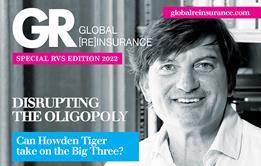The demand for capacity ‘will be an issue’ at the next renewal too, says reinsurance chief executive
The next round of reinsurance renewals will be “much more challenging than last year” due to the “external implications” of inflation, warned Torsten Jeworrek, chief executive of reinsurance at Munich Re.
Addressing delegates attending Rendez-Vous de Septembre in Monte Carlo on 11 September 2022, Jeworrek explained that “inflation assumptions are important for the price determination” at renewal, meaning that upcoming renewals will be “much, much more challenging than last year, where we had a much more stable economic environment”.
He continued: “This year, we have external implications from the economic environment.
“Inflation assumptions in pricing have to be prudent enough to anticipate further iterations of inflation in the coming months and coming years, after the renewal is fixed. This renewal is really so challenging.”
Furthermore, there is the potential for underwriters to “mess it up” when it comes to working with inflation assumptions, if they “are not prudent enough and don’t make stress test scenarios”.
Underwriters will also need to account for sector specific inflation assumptions when pricing, as some lines of business – such as motor – are more heavily hit by the ramifications of high inflation.
Jeworrek acknowledged, however, that inflation would drive “inevitable” premium volume. He predicted that although inflation would peak this year, it will still remain high in early 2023, which could impact the profitability of Munich Re’s products.
Capital and capacity
Alongside inflation, capacity will additionally “be a concern in the coming renewal”, noted Jeworrek.
For him, part of the problem here is currency and exchange rates, against the backdrop of reinsurance capital decreasing in 2022 for the first time since 2018. Munich Re reported that global reinsurance capital now sits at $435bn (£375bn), as at September 2022.
Jeworrek explained that European reinsurers will need to utilise a different exchange rate for any US business that they write. In turn, this means that the capacity Munich Re sells in euros will differ from US dollar-based capacity, which has not changed. The same trend will be applicable for all European reinsurers that write US-based business.
According to the Financial Times, the exchange rate of both the euro and US dollar when converted to pound sterling is 1.16, as of 1 September 2022.
“Without changing anything and doing anything, in euros, our exposure has increased,” Jeworrek said.
“On one hand, you have a reduced capital base globally. On the other hand, you have – in euros – a higher capacity in the market already.
“This, together with the higher uncertainty from inflation, brings us to the conclusion that capacity will be an issue, will be a concern in the coming renewal. There will be a demand for capacity.”
Greater demand for capacity will additionally be driven by the fact that “some reinsurers [have] announced or stopped writing certain lines - or at least they didn’t increase the lines anymore”, Jeworrek continued.
According to Munich Re, the capital markets underperformed across most asset classes this year, with interest rates continuing to rise.
Jeworrek said: “As far as Munich Re capacity is concerned in general, and also on the cat side, we have the financial ability and all of the ambition and will to remain our capacity unchanged, so we have no ambition to shrink it – under the assumption that the pricing is really prudent and conservative. Under these assumptions, we are willing to sell.
“[Taking] everything into consideration regarding pricing conditions and underwriting on the one hand and on the other hand, we are able to provide the same capacity and same level of reinsurance protection for our clients. We want to remain a very reliable partner, but on the basis of very good underwriting.”
GR Main Edition 2022: Disrupting the Oligopoly

As market practitioners prepare to meet once again in Monte Carlo, the current headwinds are undoubtedly challenging… but they are not insurmountable.
- 1
- 2
- 3
- 4
- 5
- 6
- 7
- 8
- 9
- 10
- 11
- 12
- 13
- 14
 Currently
reading
Currently
reading
Upcoming renewals will be ‘much more challenging’ due to inflation – Munich Re
- 16
- 17
- 18
- 19
- 20
- 21
- 22
- 23
- 24
- 25



























































No comments yet